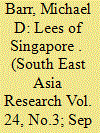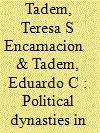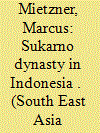|
|
|
Sort Order |
|
|
|
Items / Page
|
|
|
|
|
|
|
| Srl | Item |
| 1 |
ID:
148552


|
|
|
|
|
| Summary/Abstract |
The relative newness of political dynasties in Thai society is often forgotten by scholars and observers. The majority of Thai political clans entered politics only after the 1973 student uprising. Their time in politics is also relatively short – only half of them managed to stay in power for more than two legislative terms. Historically, their instability was caused by frequent military coups, which interrupted the parliamentary institutions and electoral process. By the time they had succeeded in climbing to the top in the late 1990s, the political and economic landscape had been transformed in a way that seriously reduced their power. Tumultuous ideological conflict and the rise of mass movement after the 2006 military coup have further diminished the status and power of old political clans. This article traces the historical developments and the patterns of accumulation of the wealth and power of Thai political dynasties and explains how some families have been able to maintain their power while many others have failed.
|
|
|
|
|
|
|
|
|
|
|
|
|
|
|
|
| 2 |
ID:
148549


|
|
|
|
|
| Summary/Abstract |
It is no secret that a dynasty has emerged as the ruling force in Singapore. The Lee family (of former Prime Minister Lee Kuan Yew and current Prime Minister Lee Hsien Loong) is referred to as ‘the first family’ as a matter of routine in private conversation, though not usually in public. Power has already passed from father to son and now there is a generation of high-flying grandsons in the wings. This article traces the establishment and consolidation of the Lee dynasty from the point in the early 1980s when Lee Kuan Yew emerged as the centre of all the significant power networks in Singapore, through to the consolidation of power in the hands of his son, Lee Hsien Loong, in 2011. In the process of doing this, it argues that despite official rhetoric that says that the country runs on the talent of the best and most talented men and women in the country, and the closely related myth that professionalism provides the basis of governance, the reality is that of rule by a family-based clique of confidantes and relatives. There is a strong element of reality to both myths, but both elements are ultimately subordinated to and in the service of the forces of consanguineous and personal networks.
|
|
|
|
|
|
|
|
|
|
|
|
|
|
|
|
| 3 |
ID:
148551


|
|
|
|
|
| Summary/Abstract |
At all levels of politics in Indonesia today, political families have a central place. The families of previous presidents and dynasties in regional and local politics have all been central to Indonesia’s decentralised and increasingly personality-driven democracy. This article presents preliminary work on a biographical study of one of Indonesia’s most prominent and enduring political dynasties, the Djojohadikusumo family, who have held positions of power in key national institutions across four generations. The study aims to improve our understanding of how this family has conceived itself within political structures as they have shifted over four generations. What characteristics of the dynasty can be identified as enabling its adaptability? How much do external and structural forces sustain the dynasty as a central player? And how much is it sustained by characteristics that are internal, historical, psychological and culturally specific to the family unit?
|
|
|
|
|
|
|
|
|
|
|
|
|
|
|
|
| 4 |
ID:
148548


|
|
|
|
|
| Summary/Abstract |
The results of the 2013 Philippine mid-term elections highlighted the dominance of political dynasties in the country. With all 80 provinces littered with political families, 74 percent of the elected members of the House of Representatives came from such dynastic groups. Despite overwhelming recognition that political dynasties breed patronage politics and corruption, no substantial steps have been undertaken to address this issue. This article examines the general nature of Philippine political dynasties, the reasons for their continuing existence and their adverse impact on the country. This problem emanates basically from three factors: (1) the political and socio-economic foundations upon which political dynasties are built; 2) the inability to effectively implement Philippine constitutional provisions by enacting an enabling law; and 3) the weakness of potential countervailing forces that would challenge political dynasties.
|
|
|
|
|
|
|
|
|
|
|
|
|
|
|
|
| 5 |
ID:
148547


|
|
|
|
|
| Summary/Abstract |
The political family has an entrenched place within the modern political systems of South East Asian states. Current and former national leaders of the Philippines, Thailand, Indonesia and Singapore are members of political dynasties and elsewhere in the region family networks play central roles in the political lives of these nations. To the international community, democracy and electoral politics signals stability and a commitment to shared standards and values for governance. In the emerging South East Asian democracies, however, family, patronage, nepotism and dynasty are also key ingredients within these polities. Some reflect generations-long traditions of political power-sharing regardless of regime type, whilst others are generated and buoyed by the opportunities presented by the democratic and electoral process itself.
|
|
|
|
|
|
|
|
|
|
|
|
|
|
|
|
| 6 |
ID:
148550


|
|
|
|
|
| Summary/Abstract |
This article focuses on the history and current political relevance of the Sukarno dynasty in Indonesia. It analyses the reasons for the political longevity of the family, but also discusses internal and external pressures that have forced the dynasty to adopt new strategies to secure its survival. The article tests a number of assertions that political theorists have typically made about dynasties and their political parties: for instance, that they are institutionally weak, electorally unstable and have low levels of representativeness. I argue that the Sukarno family has been able to mitigate most of these much-discussed deficits, but has faced a series of succession crises that, if unresolved, threaten its long-term position in Indonesian politics.
|
|
|
|
|
|
|
|
|
|
|
|
|
|
|
|
| 7 |
ID:
148553


|
|
|
|
|
| Summary/Abstract |
Scholars suggest that Indonesian decentralization and electoral democracy has facilitated the emergence of new elites and their families at both the national and local levels (Agustinus, 2010; Eriyanto, 2012; Hadiz, 2004). These familes are loosely labeled political dynasties. There are indeed many cases of political dynasties emerging in democratic Indonesia or of older dynastic families strengthening their powers, however these stories of success are not always straightforward. This article explores the case of a political family in Pekalongan, Central Java. It argues that local political dynasties are highly adaptable, shown by their shifting and changing strategies. This adaptability is a response to opportunities and threats created by other external factors within the political system (i.e. decentralization policies, and popular opinion), political competitors, as well as internal factors (family).
|
|
|
|
|
|
|
|
|
|
|
|
|
|
|
|
| 8 |
ID:
148554


|
|
|
|
|
| Summary/Abstract |
The rise to power of political dynasties in regional Indonesia has been the subject of much critical analysis by scholars and journalists, with most seeing the phenomenon as a symptom of the wider democratic shortcomings of the post-Suharto period. This article examines the successes and travails of political dynasties in regional Indonesia by focusing on the province of Central Kalimantan. It begins by defining political dynasty, differentiating it from allied terms, outlining competing scholarly explanations for dynastic formation, and noting the critical issue of inter-generational succession. The article then examines subnational dynasty formation in Central Kalimantan, where in seven out of eight districts in the relevant time period a sitting bupati (district head) attempted to engineer dynastic succession, but succeeded in only two. The examination shows that while political opportunity structure accounts emphasising state and party weakness help explain the explosion of attempts to establish political dynasties in democratic Indonesia, the failure of most such attempts to consolidate inter-generationally indicates that we must be cautious in judging how stable these new political formations will become. Would-be subnational dynasties in Indonesia continue to face formidable competing sources of political authority which make it difficult for them to establish themselves over multiple generations.
|
|
|
|
|
|
|
|
|
|
|
|
|
|
|
|
|
|
|
|
|